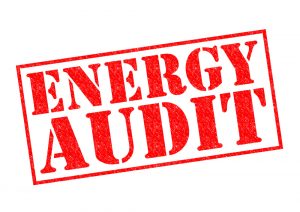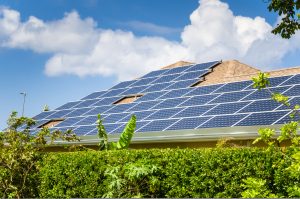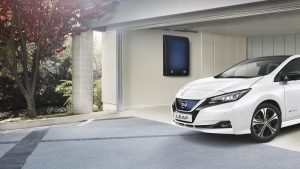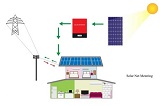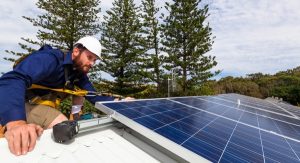At-home batteries are a must-have for anyone who plans to convert their home to solar power. The batteries store the electricity the solar panels generate, which can then be used at night or during peak hours to save money on your electricity bill.
However, the batteries in these at-home systems are the same ones that charge electric vehicles, which is why many automakers are now offering competing systems.
First, here’s a recap on Tesla’s Powerwall, which is a 264-pound wall-mounted lithium-ion battery. Panasonic makes the cells for the battery, while Tesla builds the battery module and pack.
A single Powerwall unit stores 14 kWh of energy, but you can create a chain of as many as 10 batteries to increase storage. One unit can cost up to $11,450, which includes the installation.
Tesla has offered battery and solar installations as an all-inclusive process since its purchase of SolarCity in 2016. Tesla now also sells solar roof shingles that mimic the look of a traditional roof for a sleeker and more streamlined look.
10 Home Batteries to Compete With the Powerwall
LG Chem’s RESU battery – offered in partnership with solar company Sunrun – might be Tesla’s closest current competitor. The LG Chem RESU comes in a range of sizes from 3.3 kWh to 9.8 kWh. The RESU allows users to maintain a continuous power supply during the day or night. However, it isn’t intended for off-grid usage.
- Enphase offers a battery with modular architecture to allow flexible installation. With a minimum 10-year expected life and 96 percent efficiency, it is also the first home battery to receive UL 9540 system certification. Its easy installation makes it more affordable than many comparable systems on the market.
Nissan’s entry into the home battery market is called xStorage, which holds 4.2kWh of power. The automaker currently only sells the xStorage in the UK. The six-panel system stores its power in recycled Leaf batteries as an environmentally sound solution.
- BMW has announced its intentions to sell two home battery options that can store a massive 22 kWh and 33 kWh worth of energy, but they have yet to launch. Like Nissan, BMW will take an earth-friendly approach by reusing batteries from its BMW i3 series.
- Sonnen, a German company, sells several at-home battery options with up to 16 kWh of storage. Their eco compact version holds 4 kWh of energy and comes with an included inverter. The company earns more than half its revenue from its German operations, but has opened a factory in Atlanta, Georgia, to begin production for the U.S. market. It has also announced intentions to expand to Australia, the United Kingdom and Italy.
- The Pika Energy Smart Harbor Battery relies on Panasonic-built lithium-ion battery cells and comes with a Pika Energy Island inverter for both on-grid and off-grid home energy storage. Sizes range from 10.6 to 15.9 kWh, and it comes backed by a 10-year Panasonic warranty.
Sunverge offers a range of battery systems that store anywhere from 7.7 kWh to 19.4 kWh of power. Sunverge comes with a companion app so you can track your solar energy storage and see how much electricity costs at various times.
- Powervault is an at-home battery system currently available in the UK. All units come with an inverter, and the most powerful model stores 6 kWh of energy.
SimpliPhi Power is an at-home battery maker formerly known as LibertyPak Company. SimpliPhi offers several battery options, the largest of which stores 3.4 kWh of energy.
- Panasonic, which makes the cells for the Tesla and Pika Energy batteries, also makes its own unit that can store 8 kWh of energy. Currently, only Australian customers can buy this system.


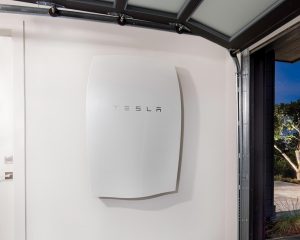
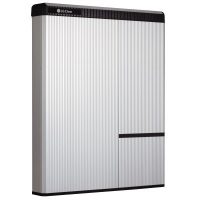 LG Chem’s RESU battery – offered in partnership with solar company Sunrun – might be Tesla’s closest current competitor. The LG Chem RESU comes in a range of sizes from 3.3 kWh to 9.8 kWh. The RESU allows users to maintain a continuous power supply during the day or night. However, it isn’t intended for off-grid usage.
LG Chem’s RESU battery – offered in partnership with solar company Sunrun – might be Tesla’s closest current competitor. The LG Chem RESU comes in a range of sizes from 3.3 kWh to 9.8 kWh. The RESU allows users to maintain a continuous power supply during the day or night. However, it isn’t intended for off-grid usage.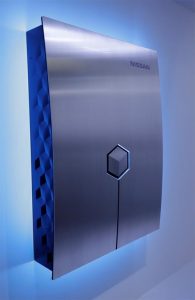 Nissan’s entry into the home battery market is called
Nissan’s entry into the home battery market is called 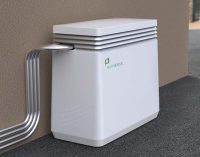 Sunverge offers a range of battery systems that store anywhere from 7.7 kWh to 19.4 kWh of power. Sunverge comes with a companion app so you can track your solar energy storage and see how much electricity costs at various times.
Sunverge offers a range of battery systems that store anywhere from 7.7 kWh to 19.4 kWh of power. Sunverge comes with a companion app so you can track your solar energy storage and see how much electricity costs at various times.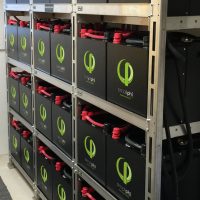 SimpliPhi Power is an at-home battery maker formerly known as LibertyPak Company. SimpliPhi offers several battery options, the largest of which stores 3.4 kWh of energy.
SimpliPhi Power is an at-home battery maker formerly known as LibertyPak Company. SimpliPhi offers several battery options, the largest of which stores 3.4 kWh of energy.